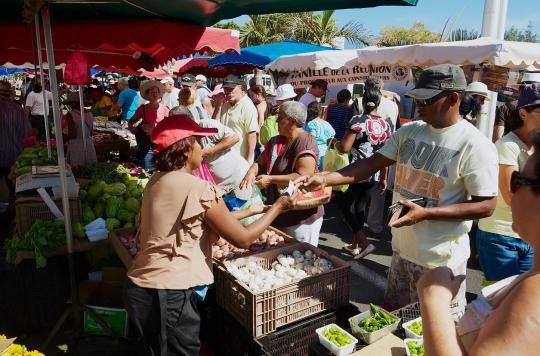In Guadeloupe, Guyana, Martinique, Mayotte and Reunion, the most vulnerable populations are particularly exposed to obesity, diabetes and hypertension. The reason: foods that are too sweet and too expensive.

Terrible social inequalities in nutrition between the French. “Today, strong social inequalities in health, in particular for diabetes, obesity and hypertension, persist between the most socio-economically advantaged individuals and those living in less favorable situations in France, and in particular in -sea”, warns a report from the Research Institute for Development (IRD) Released Tuesday, November 19. The latter was commissioned by the General Directorate of Health in order to consider a variation of the National Health Nutrition Plan in the Overseas Territories “by integrating the specificities of these territories.”
To establish its “scientific expertise on the nutritional status and diet of overseas populations” (the scope concerns Guadeloupe, Guyana, Martinique, Mayotte and Reunion), the IRD mobilized “a multidisciplinary committee of experts , made up of epidemiologists, nutritionists, public health doctors, economists, endocrinologists, diabetologists and sociologists,” he explains in his report.
During their research, the scientists were thus able to observe that in the DROMs (Overseas Departments and regions), the prevalence of chronic illnesses linked to food was much higher than in mainland France. Indeed, 39 to 45% of the inhabitants of Guadeloupe, Martinique, Mayotte and Reunion suffer from arterial hypertension against 31% of the entire French population. As for diabetes, it affects 10% of Martiniquans, 11% of Guadeloupeans and 14% of Reunionese against a national average of 5%.
Women more affected by precariousness and obesity
Moreover, in the five overseas regions studied, the differences in prevalence between the lowest and highest socioeconomic category reach 20 points for obesity, for hypertension and between 10 and 20 points for diabetes. “Socioeconomic disparities are much greater among women than among men in the five territories, highlighting a cumulative effect of socioeconomic and gender factors, a phenomenon also observed in France,” note the researchers. In Mayotte, 79% of women aged 30 to 69 are overweight. Among them, 47% are obese.
“I was struck by social differences in prevalence in these territories where inequalities are very strong”, comments Caroline Méjean, epidemiologist from the National Institute for Agronomic Research (INRA), who led this work, quoted by The world.
In the five areas studied, the researchers observed an overconsumption of fatty and sugary products, and in particular of sugary drinks and fruit juices. Conversely, the consumption of fruit, vegetables and dairy products is lower than in France and much lower than the recommendations, “which leads to low calcium and fiber intake”, notes the report.
Sweeter products than in France
In terms of products, imports represent 80% to 90% of the available supply. This phenomenon, uncompetitive distribution and local tax mechanisms could explain why the level of food prices is 20 to 30% higher than in France.
But despite higher prices, the populations of the DROMs have lower incomes than those of the inhabitants of the metropolis. Consequently, the share of the household budget devoted to food is much higher in the Overseas Territories: 23.5% in Martinique and 31.5% in Mayotte against 19.1% in France.
Another inequality, and not the least, concerns the nutritional composition of the products, noted the experts. At the beginning of the 2010s, doctors warned of much higher sugar content in several products sold in the DROMs. In 2013, a law was then passed to guarantee the quality of the food order in these territories. But if this makes it possible to fix the maximum sugar content by category, it does not prevent the average of the products from remaining sweeter. Too sweet. What is more, this law has never been the subject of any statistical monitoring and its proper application could therefore not be verified.
Regional disparities in health services
The experts have also noted disparities in the supply of health and care services and their accessibility in the overseas regions. The latter could contribute to explain the differences observed with mainland France for nutritional problems. “It should be noted that there is a shortage of general medicine and specialists in nutritional problems, which explains the greater use of home nurses; the centralized offer can be very remote”, details the report.
Finally, concerning sport, studies show an overall level similar to that of France: approximately one third of the populations of the DROMs have regular physical activity (at least five times a week). But despite this, the Overseas Territories remain under-equipped in terms of infrastructure (-30 to 40% compared to the national average), warns the report.
And the experts conclude: “Focusing on actions for the prevention, screening and management of nutritional problems, primarily targeting women from disadvantaged socioeconomic categories, could contribute to reducing social inequalities in nutrition.”

.
















